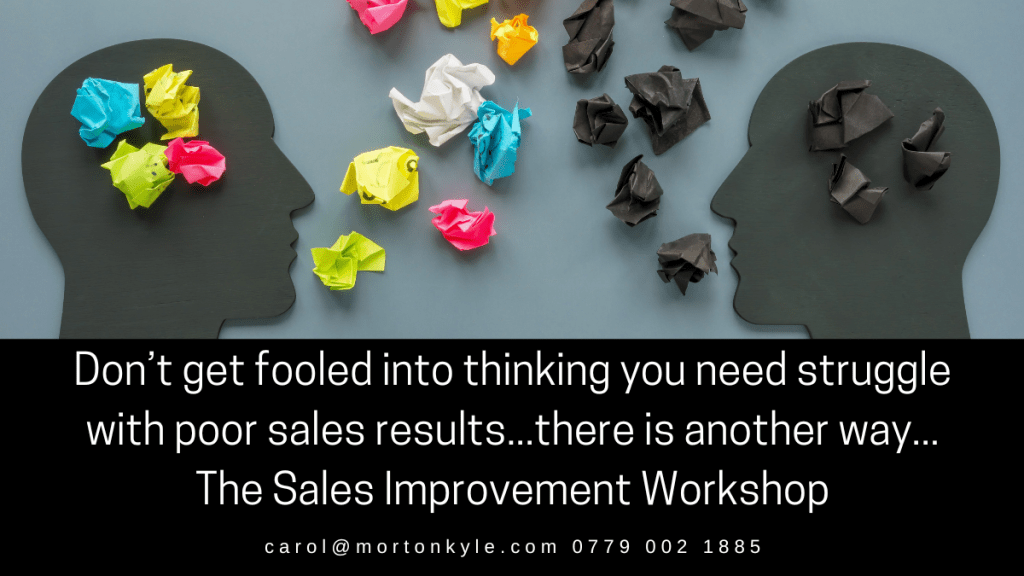Managing poor sales performance takes effort, but that’s probably because you’re only looking at sales performance management when the sales results dip – instead of being focussed on hitting sales targets every single day.
Yet this is what needs to happen. Managing a sales team daily, sales rep by sales rep, to avoid low sales performance is a must if if low risk and low cost growth is part of your plan.
The secret to running a high performance sales team and hitting sales targets is to know your numbers – not just the top line numbers you report on but the numbers that feel the top line, and the numbers underneath that – if you’re looking for help on this check out – The Sales Insight Audit and Simple Sales Forecasting
Right, now back to managing poor sales performance….and consistently hitting sales targets
Waiting to tackle poor sales results when they have already started to slide is a nightmare, and it’s going to land squarely on the shoulders of the sales manager – which makes it just another entry on the never ending to do list.
So, long story short, you can either:
- Set up a way of working to maximise/optimise sales results every day or
- Wait until they dip and them spring into rescue and repair
Which option will free your time, lead to more stable results, allow you to accurately forecast and manage itself? Option 1
Option 2 is not a smart option, loaded with stress, open to failure, and sits on the sales leaders shoulders unsupported.
Introducing Positive Sales Performance Management for Sales Performance Improvement and Hitting Sales Targets
Have you ever been in one of those meetings where someone asks you what your plan is and how you intend to deal with low sales performance?
It can be rabbit in the headlines time can’t it?
That’s when it helps to have a proven plan, a solid framework to build success, because how you manage the sales team when the figures and good, and when they are less than ideal matters a lot in terms of growth stability and the future of the business, because the truth is….
High performance sales teams don’t happen by chance, neither does hitting sales targets, but payback on the effort required to build such a team has a huge multiplier.
And it all starts with how you and the team think about sales performance management.
To discover how we have helped 100’s of organisations build their sales engines and positively deal with sales performance using Positive Performance Management then check out our Sales Improvement Workshop. This is designed to tackle all of the critical issues in sales performance improvement.
Positive Sales Performance Management | A Sales Transformation Journey!
From a sales team with unpredictable sales results to consistently hitting sales targets….It’s time to put the sales team at the heart of managing poor sales performance, and taking pressure off the sales leader.
If you’re struggling with any aspect of poor performance within the sales function, sales not being as you’d like, not being able to release the real sales potential within your business, then you don’t need to just put up with it!
There is another way. A way that not only solves your sales performance issues today, but lasts long after next quarter’s revenues have been reported….you can find more details over here – The Sales Improvement Workshop
But in the meantime…take a look at these to get you started…
The Number 1 Rule for Managing Poor Sales Performance and Sales Performance Improvement
If you find yourself responsible for managing poor sales performance, speed is your friend, Call it out early, unpick it fast, and reset the required metrics. Offer support, guidance, insight and any training or coaching that’s needed.
And do it fast.
The longer you leave it – the tougher it will be to reverse and making hitting sales targets much tougher.
But, and this is where many sales leaders let themselves down, you must transfer the responsibility for improving directly to the team – as an individual rep and as a group collective. Sales performance improvement can’t just sit on the leaders shoulders.
Taking swift responsibility, you’ll find it easier to do right by the sales person, right by the business, stick within the realms of good HR practice, document everything in the hope that everyone can make the change.
But you can’t lead the change. You provide the conditions and the support to happen. Accountability and responsibility reverts solely to the underperforming team. They own their figures and performance. You are the support function to their transition from underperformance to success.
If you need more help, or want to introduce your team to working this way The Sales Improvement Workshop covers all of this and much more you need to consider in the broader scope of sales performance improvement.
Transformational Sales Management | Smart Sales Leaders Do This!
Once you’ve righted the sales figures it’s often the case that you’ll go back to business as usual, until the next slide in sales figures.
Smart sales leaders who are keen on hitting sales targets don’t do that!
Smart sales leaders will continue to run the team using exactly the same process they did when the sales results were less than ideal.
It’s Positive Sales Performance Management because what you’re really looking for is a heartbeat system that will allow you to grow sales capabilities and sales results without increasing headcount – we give you all the skills and templates you need to do this in our Sales Insights Audits
It’s Positive Sales Performance Management – the Route to Consistently Hitting Sales Targets
And the reason why smart sales leaders adopt this way of addressing sales performance improvement – for high performers, mid and low performers is that it shifts the onus for accountability and responsibility from the sales leader to the sales rep!
It changes the game immediately….and forever.
Because the sales leader is now freed to take a helicopter view – more focus can be given to growth and not repair and maintenance.
What Do You Need to Adopt Positive Sales Performance Management?
Managing a sales team to avoid low sales performance is a must if if low risk and low cost growth is part of your plan. We cover this in detail in the Sales Improvement Workshop but to get you started you need some good solid sales performance stats – specifically around:
- Enquiries
- Leads
- Opportunities
- Meetings
- Quotes
- Sales
Also add in some activity based metrics around:
- Dials
- Connects
- Talk time
Next – add in some longer term metrics like:
- Conversion rates
- Pipeline value
- Pipeline value by stage
- Average order value
- Sales cycle duration
- Win/lost rations
- Competitor wins
Make it easy for each rep to get these stats and be confident and conversant enough to discuss them, and be able monitor up and down movements
Everyone does this….every single rep.
As a Smart Sales Leader your job is now to offer support and help at the first sign of ANY negative non-conformance – speed, insight and action – the hallmark of Positive Sales Performance Management!
For more details on how to set this up – talk to us about our Sales Performance Audits where we give you all the critical sales improvement stats you need to start proactively driving growth and helping your sales team help themselves!
Don’t Leave Sales Performance Improvement to Chance – Start Hitting Sales Targets Today!
Poor sales performance management costs money, time, resources and missed opportunity, and the very worst part is, you’re most likely contributing to your competitors growth.
Managing poor sales performance efficiently, effectively and with minimum impact on the rest of the sales function is vital.
After all, letting sales results slip too far, then having to sinking time and effort repair is a huge risk with no guaranteed short term payback, so anything you can do to:
1. Set it up once and then let it run itself
2. Speed up the process
3. Reduce risk
4. Guarantee success
5. Make sales performance management a positive experience
Will automatically minimise the negative impacts associated with having to manage, support, train and develop poor sales performers, as well as make the rest of the team/business feel you’ve not deserted them.
Even better if you can build in some team metrics – helps foster peer to peer support and again, helps a smart sales leader focus on the things that only they can do!
Every Sales Team Suffers From Sales Dips – What Matters is the Speed of the Fix!
It’s estimated that in any one year between 50% and 55% of sales reps don’t make sales target.
The reality is, if you’re not managing poor sales performance in your company, managing it so every sales person hits target in your business, you could be missing out on the opportunity of doubling your sales turnover without increasing your headcount!
One of the key wins from the Sales Improvement Workshop is the efficiency and productivity increases from stripping out what’s not working to replace it with what is!
That’s right
”…you could be missing out on the opportunity of doubling your sales turnover without increasing your headcount!”
Now that’s a shocker.
Managing Poor Sales Performance – What Are You Prepared To Do When Sales Targets are Missed?
Personally, I hate under performance…it means there’s something wrong, it’s expensive and I never know when a sales dip’s going to bottom out, so I favour fast repair and reboot…
But before any repair or reboot can be done, you must identify where the fault sits in terms of things that cause poor sales performance…we cover this in the Sales Improvement Workshop too, but for completeness here, it could be because
1. The sales targets are set wrongly, so chances of success are limited
2. The sales recruitment is off track because the business needs a different sales skill set than originally thought
3. Reward and recognition program is failing, hence staff aren’t motivated to achieve and bear no consequence for under achieving
4. Sales management is failing, and this can be for a number of reasons
5. The market has changed and you’ve been caught napping
6. The competitors are getting stronger, more aggressive, focused, tenacious
7. A region is not performing as well as it should for geo/economic/political reasons
8. Pricing is out of line and not responsive or dynamic
9. Not trained the staff well enough
10. Not coached/supported the staff often enough – see our special Sales Coaching Offer
11. failing to keep accurate temperature of the market forces and prospects fads
12. not buying/creating good quality leads or data
13. don’t have a great lead generation system or new business development plan
14. targeting the wrong type of prospects
15. targeting the right type of prospects with the wrong offer
Any combination of the above sound familiar?
You Don’t Need to Struggle | Sales Performance Improvement is a One Time Skill Development with a Lifelong Payback!
Managing poor sales performance is not a black art….but it is a very necessary one if managing a sales team to avoid low sales performance is a must if if low risk and low cost growth is part of your plan.
Sales performance management can be simple….but success comes from consistently applying the basic principles.
It’s about identifying a leak and fixing it to get the desired sales results….or at least as near to the target as you can.
And what’s even better is that, when you do fix the poor sales performance, it’s a win for the whole sales team.
Managing poor sales performance quickly, simply, smoothly, efficiently, effectively, with minimum risk and maximum chances of success is possible?
Absolutely! The question is – are you set up to work this way?
Sales Performance Improvement | Are Your Set Up To Work This Way?
You should be!
It’s an absolute must if you’re a hungry sales manager…everyone is on a continual performance management program…every single one of the sales team, performers, those playing catch up, super stars, the nearly there and the unskilled/unwilled…keep everybody on a sales performance program ALL THE TIME.
And, it’s a POSITIVE experience remember. Not all on you. The rep takes the responsibility for maintaining their figures. They address non-conformance as a team and as a peer group. You become an external resource. A support function. A ninja trouble-shooter.
Start date? The minute your sales team join your team!
Now, let’s look at what to do if already have a poorly performing sales team and need help on managing poor sales performance.
First of all consider why you should be alert to managing poor sales performance:
1. What would it mean to the business if you could move the bell curve that typically denotes sales team performance just slightly to the right indicating that more of the sales team would be hitting target or be above target….
2. What are the poor performers costing you? Consider not just the salary bill, car, benefits etc, instead think also about the lost opportunities, the increased time between expressions of interest and purchase order, the higher sales acquisition cost, the likely reduced margin….
3. Consider the impact of not managing poor performers on the morale and motivation of those sales people who always hitting target, carrying the poor performers? After all, sales is a meritocracy, so why should the performers and the non-performers be treated in the same way and both allowed to keep their jobs?
What could you do as part of managing poor sales performance?
- Some organisations will put a revolving door on the sales office for the poorer performers. The under performers either make the grade or they go. In fact, many larger organisations will adopt a process of forced ranking where the bottom 10% will be asked in improve within 3 months or find alternative employment either within or outside of their organisation.
- Some organisations will look at the sales team as a whole and maintain the performers, exceptional performers and under performers in the same environment, on the basis that they accept the bell curve model and appreciate that this is possibly as good as it gets.
- Some organisations may invest heavily in the poor performers training, coaching, mentoring and offering additional support.
Every sales management team and business will have its own way of dealing with poor sales performance.
What type of organisation are you in, and what are you doing at the moment to manage poor sales performance?
Sales Management complain that when dealing with poor sales performance, it is the huge amounts of time it takes addressing the individuals and their problem(s) that causes the biggest upset. All sales managers should be supportive and invest, of course, but many fully understand that it’s so much time and effort with no guaranteed return can be a thankless task. And that mindset brings it’s own set of problems.
However, let’s not forget, it’s worth every minute when it works!!
Collectively, over the years we have designed a few techniques to address the issues associated with poor sales performance and managing poor sales performance.
You might also want a second opinion – at no cost to you whatsoever – just book in a call, let’s see if we can introduce some workable solutions for you to think about – and I promise, no pitching, just advice that’s worked for others.

Managing Poor Sales Performance – 22 Point Summary for Sales Performance Improvement
These points are critical if managing a sales team to avoid low sales performance is a must if if low risk and low cost growth is part of your plan.
1. Start formal sales performance management action immediately. If the sales person hits target and works then there is no issue. BUT if they don’t hit target and it doesn’t work out and the sales performance doesn’t improve then you’ll have a documented course of past remedial action, such as is needed to support your recommendations and decisions. Managing poor sales performance needs immediate ongoing action.
2. As part of managing poor sales performance set tight and short term targets to help them focus…half daily if necessary. Some under performers feel swamped so clarity and direction maybe lacking. Make it easy for them to perform.
3. Ask them what hurdles they are experiencing – and remove those hurdles temporarily from their desk…whatever that takes. As part of managing poor sales performance give them freedom to deliver and see what difference it makes.
4. Explore each deal in the forecast/pipeline with them and agree on a strategy to make things happen – time consuming but often pays very high dividends. This is a crucial part of managing poor sales performance.
5. Put the responsibility for their success firmly in their hands, whilst making yourself as accessible as possible. Under performers need to understand the tactics and techniques for driving sales performance when their sales hit a dip. As part of managing poor sales performance, you need to give them those skills and insights.
6. Have daily meetings to discuss performance, so they can update you on progress, in other words, don’t let them lose heart because they need to know you are on their side.
7. Encourage them to concentrate on what they have in their pipeline and have already qualified, as opposed to random cold calling.
8. Complete accompanied visits with potential clients and the under performer. This is vital. The more time you spend with the under performer, the greater their chance of success, and the sooner they’ll start to perform in line with expectations.
9. Generate a time sensitive to ‘close’ list daily because side by side management of this list of activities build confidence and action mindset.
10. Watch the attitude as well as the skills. Perfectly competent sales people can under perform when the attitude is wrong, even if the skill levels are high.
11. Address any obvious sales skills that are poor/missing.
12. Find out what their motivators are, and use them.
13. Partner them with some of your more professional and performing sales people – accompanied visits, but don’t saddle the performing sales person with your responsibilities.
14. Conduct sales pipeline analysis – where in the sales pipeline are deals falling over, getting stuck or falling apart? It may be a skills deficiency or a simple mind set shift that’s needed, consequently you can determine which it is.
15. Get them to go back to established and happy customers to get referrals, to cross sell, to up sell. Anything so that they get to taste success because this is so important. It’s tough to break a long line of sales failures, hence tasting success is a valuable jump start because everyone needs that.
16. Strictly assess skills…do you have a farmer in a hunter role? Do you have a customer service super star trying to climb a mountain of new business…look for their strengths and not just their weaknesses. and subsequently place them where they play to their strengths, where this is possible.
17. Let them see you selling and making profit in their sector. Being successful on their patch with their clients because that’s when they get to see what’s possible, when you show them what’s possible
18. Test their market knowledge – total immersion, because that’s the only way to find out what they know, what they don’t know, what they should know and make sure they close the gaps.
19. Do not load too much pressure on the under performer because it won’t help, moreover, it’ll most likely send them backwards.
20. Punch drunk training sessions – role play and role play some more. With you and them in a room, hit them with every single objection and sales avoidance technique you have. Either way, just kill them with the speed, ferocity and force of your NO argument and help them work out how to fight back with their YES sales position
21. The sales person should display a high energy state every day, what that means is no slouching into the office, got to show up pumped for another day to turn this around.
22. Do a psychometric test on the under performers, because at this point, like Sherlock Holmes, you’re looking for clues to indicate where the blockage is…
I know – you’re shaking you head wondering ‘what the hell’.
I’m hearing you. It’s a valid reaction.
But the truth is you have a few choices. You can seek to find and cultivate the skills and attributes you identified when you recruited this person and work with them to make their and your dream a sales reality.
Or, you can call HR. Go through the process and start again. You always have that choice and that’s a conversation you’ll probably have every time the poor performer comes into you mind or crosses your eye line.
Managing sales performance is a day to day activity, and managing poor sales performance is no difference. Introducing Positive Sales Performance Management from day one as the de facto way of operating is the easiest and fastest way to build a high performance sales team.
Either way, early intervention is vital.
Performance management shouldn’t be left until the relationship between management and staff is strained or has deteriorated. People can become defensive and uncooperative and these are counter productive responses to what you are trying to achieve.
Managing poor sales performance is a time consuming process, it may or may not work.
I have seen some sales people take upwards of 12 months to reach their full potential.
I have also seen some sales people who should have got better results. They were unable to pull in the sales results required to secure their position. Yet, on moving to another firm have gone on to very highly regarded positions in other sales roles. Roles where they have consistently hit their targets. So, some times we all have to recognise that that fit doesn’t work.
My Personal Philosophy on Managing Poor Sales Performance
I guess my personal philosophy on the matter is this;
Manage sales and commit to doing everything within your power to assist the under performer, however, there is one caveat. If improvements don’t appear, do what is best for the other person, sometimes organising an exit is best for them.
Note – Getting good HR advice is invaluable. As is good legal advice. Both are part of your solution before any action to dismiss is taken.
If you want some starting points for managing sales performance, one of the easiest places to start is to look at the sales metrics you’re using to manage the team. If you’d like to get a stronger handle on your sales metrics, check our the Sales Insight Audit to give you everything you need to build a sales performance improvement model in your sales function.
Managing poor sales performance is key. Addressing it quickly, smartly and legally, and with the best interests of all parties at the forefront of your intentions
Simply put, avoiding it won’t make it go away, the sooner you dig in, spot the signs and get a big spotlight on your cause then the greater your chances of success
So, when it comes to looking at how you can deal with poor sales performance, then you can hope and pray or take proactive action today! Only one of those will help you sleep better AND put you back on the road to getting the very best sales results you possibly can. So why stress when you don’t need to?
Act Today – Not Sure About How to Deal With Poor Sales Performance?
Book your call today – Carol on 0779 002 1885, alternatively check out the How to Deal With Poor Sales Performance
No-one should have to tolerate the negativity that comes from not getting the sales results you want, need, deserve and have worked for, so whatever stage you are in your organisation, managing poor sales performance is a must do to give you the greatest options for growth and sales success.
Book your call today and make managing poor sales performance a thing in your past! Managing a sales team to avoid low sales performance is a must if if low risk and low cost growth is part of your plan.
How To Reply To Poor Sales Performance Questions?
Tell them you’ve got a proven plan to build sales capabilities in the sales team by unblocking current sales challenges and accelerating the team’s sales performance using positive performance management, deep sales analytics and intensive sales training and coaching – then call 0779 002 1885

Hi, welcome to Morton Kyle Limited.
As Founder and Lead Consultant, I’ve spent the last 30+ years in the trenches of sales—fixing broken pipelines, rebuilding underperforming teams, and helping businesses close more deals at higher margins.
I’ve worked with global brands, challenger firms, and fast-growth sales teams, helping them:
✔ Fix underperforming pipelines – turning ghosted leads into closed deals.
✔ Increase win rates – without discounting or chasing bad-fit prospects.
✔ Build sales systems that actually work – so you don’t waste time on ‘busy work’ that doesn’t convert.
I’m not another ‘sales trainer.’ I don’t teach theory. I fix sales problems – fast. And if you’re still reading, it means you’ve got a problem that needs fixing.
I know how sales leaders think because I’ve been one. I know what the board wants because I’ve sat in those meetings.
And I know what works – because I’ve done it, tested it, and proved it across industries, markets, and economic downturns.



